Last year, a Tripadvisor member survey suggested 79% of travellers chose accommodation that had adopted eco-friendly practices and 71% planned to make more eco-friendly travel choices in the next 12 months. A Nielsen report from 2013 stated that 46% of travellers would pay extra to buy products from socially responsible enterprises. Statistics not to be taken lightly, especially when you’re sitting down to structure your holiday rental business plan.
In this article, we’ll look out how you can apply rules and make economical changes that will reduce the energy and water consumption in your holiday rental. And how you can be a responsible advocate for your local community.
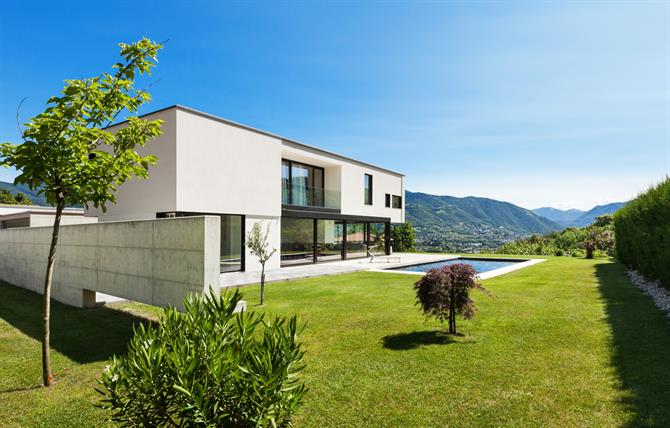
How can owners be more responsible?
Boiling a kettle, switching on the air conditioning or heating, having a shower or using the oven, all these daily habits consume energy and when you have guests staying in your holiday rental, more often that not, conservation is the last thing on their mind. As an owner, you are responsible for reducing the carbon footprint of your holiday rental and ensuring your local community benefits from your business.
Getting your guests involved
OK, the initiative has to come from you, but it’s a good idea to get your guests involved. Write up a fun list of ways they can participate in your conservation effort - your Golden, or should I say, Green Rules. Chat through the list with your guests on arrival, or keep it in a visible spot if you’re not there to meet and greet. And absolutely let them know you appreciate their collaboration.
Your Green Rules might look something like this...
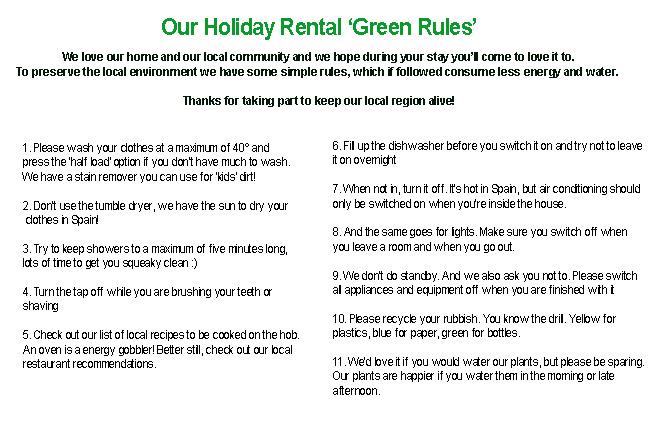
Ways to make your holiday rental more energy efficient
Now you might be thinking, “hold on, is this going to cost me a lot of money?” Creating your eco-friendly holiday rental can fit in with any budget; with even the smallest gestures making a difference. Just remember, for every Euro you invest on energy saving, will be a Euro saved long-term on your utility bills.
In the kitchen
Using an oven is the least energy efficient way of cooking food, after a microwave and then hob. Investing in an energy efficient oven (A grade energy label) would make your kitchen highly efficient, however, a less expensive idea is to leave your guests a list of local recipes that use the hob, rather than the oven. Not difficult, as it’s more typical to use the hob or ‘fuego’ in Spanish cooking.
"If everyone boiled only the water they needed to make a cup of tea or coffee instead of 'filling' the kettle every time, we could save enough electricity to run practically all the street lighting in the UK."
So says the UK Energy Saving Agency. You can ask your guests to only boil the water they need, or you can buy an Eco Kettle, which does the job for them. You’ll probably find many Spanish guests who won’t be accustomed to using a kettle and will prefer to boil water on the hob.
Lighting and temperature control
Most of you will have low-energy light bulbs fitted, but if you don’t, switch now. Energy saving light bulbs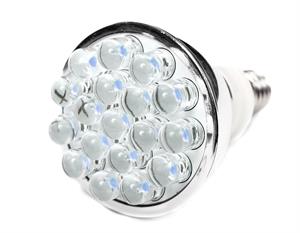 use about 10% of the energy of a normal light bulb and last around 25 times longer.
use about 10% of the energy of a normal light bulb and last around 25 times longer.
Set the hot and cold temperatures a few degrees lower on your air conditioning and do the same for heating systems, and ask clients nicely not to change it. Alternatively, you could buy a programmable thermostat that increases temperatures during the hottest period of the day.
A ceiling fan creates a nice cooling effect on the skin, although it doesn’t actually cool a room down. Compared to air conditioning they use very little energy, especially if you buy an Energy Star rated model. Don’t keep them on continuously though, as they won’t cool down your room, so it becomes a waste of energy.
For the cooler winter months, biomass boilers are impressive emission reducers. Running on wood chips or biomass pellets, they will cut your winter costs down dramatically.
Lounging around
Your lounge is the recreational centre of your holiday rental, and as such is probably home to energy consuming equipment, such as a television, computer, stereo and games consul. You can ask your guests not to leave equipment on stand-by, but it’s also a good idea to invest in an ‘Intelligent Mains Controller’, which switches all equipment off linked to your TV, when your TV is switched off.
If you want to go completely green, you wouldn’t offer this type of equipment in your holiday rental. Unfortunately, we all know that in this day and age, although you might be attracting one conscious traveller, you would probably cut out 10 less conscious holidaymakers.
Bathroom antics
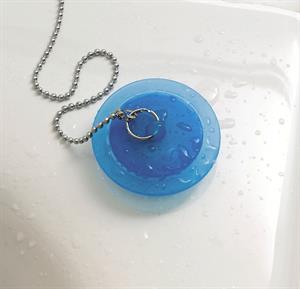 Water conservation should be as important in your holiday rental, as energy conservation. Especially in a country like Spain, where water can be scarce during the summer months. Many owners don’t connect with the fact that every time you save hot water, you also save energy, and in turn save money on your utility bills.
Water conservation should be as important in your holiday rental, as energy conservation. Especially in a country like Spain, where water can be scarce during the summer months. Many owners don’t connect with the fact that every time you save hot water, you also save energy, and in turn save money on your utility bills.
Installing water saving aerators in your taps can save up to 60% of water consumption and the same goes for low consumption shower-heads. For a relatively low outlay, you can save both energy and water. Fixing a dripping tap can save tens of litres of water every day, so get that screwdriver out.
Flush it away: Did you know around 30% of your daily water consumption is flushed down the toilet. Installing a dual-flush device in your toilet is an easy, economical and effective way of saving up to 50% of water for every flush!
Green up your cleaning!
Conventional cleaning products might leave everything super clean, but many are also incredibly damaging to the environment and to the air we breath. If more of us switched to greener cleaning and laundry products, there would be many tonnes less of chemicals and detergents clogging our waterways and landfills every year.
So when you next do a 'cleaning' shop, why don't you consider switching to an eco-certified product. You could even go one step further and try a completely natural cleaning routine: vinegar, lemon juice, baking soda, salt and pure soaps, are just some of the alternatives that will leave your home clean and fresh smelling and your guests will be able to breath easier.
How green is your garden?
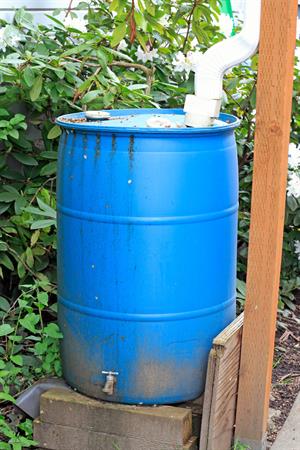 Installing a water butt or rainwater harvester in your garden is a great idea and relatively inexpensive. You collect and store rainwater throughout the year and use it to water the garden, amongst other uses. Although rain isn’t something we see much of during the summer months in Spain, it’s something you can use all year round and contributes to saving much needed water in your local region.
Installing a water butt or rainwater harvester in your garden is a great idea and relatively inexpensive. You collect and store rainwater throughout the year and use it to water the garden, amongst other uses. Although rain isn’t something we see much of during the summer months in Spain, it’s something you can use all year round and contributes to saving much needed water in your local region.
If you have green fingers, we recommend going native, with your choice of plants and trees. They generally need less watering and resources, compared to exotic plants and are less prone to disease, as they are used to their native environment.
Another great idea for keeping your home cooler is to plant native bushes or trees close to windows and patio doors to add some shade and keep the interior of your home cooler.
Generate your own power
The biggest saver, but of course the biggest outlay, comes from generating your own power. Solar panels and solar water heaters, ground source heat pumps and wind turbines, are just some of the renewable energy technologies you could install in your holiday rental. All signify considerable expenditure and work to set-up, but long-term are great for your pocket, saving lots on energy bills and reducing your carbon footprint.
It’s worthwhile calculating the savings. If you have a high consumption holiday rental, installing a renewable power supply could substantially decrease your yearly outgoings, improving the rentability of your business.
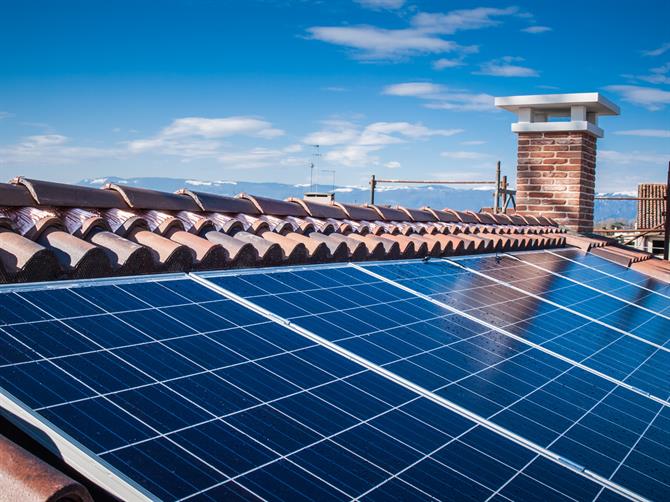
Putting back into the community
Responsible travel isn’t just about reducing the negative impact to the climate, it can also empower local communities, preserve cultural and natural resources and all importantly, it brings economic benefits to a local destination.
So, be an ambassador for your local community. Starting from the products you put into your welcome basket, to the restaurants, shops and activities you recommend. Creating an ‘Insider’s Guide’ to your local area and its businesses is a great way to get your guests investing in and exploring the local region. An Insider’s Guide is your personal and exclusive recommendation to your community, local products and producers. An opportunity for your guests to ‘live like a local’ during their holiday. We’ll talk more about the Insider’s Guide in a separate article.
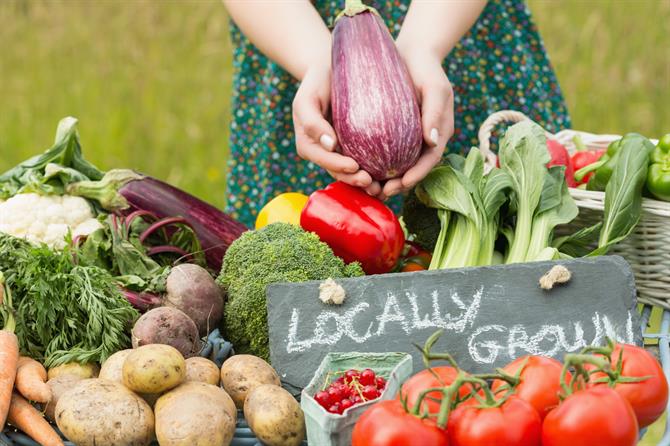
Wherever possible recommend amenities, shops, restaurants and activities that are within walking distance from your holiday rental, then your guests won’t need to use a car every day. One of our enterprising homeowners told us how he has started to offer both electric and solar powered car rental; low-speed golf-style cars, which allow his guests to get around the local community, without harming the environment. What a great idea!
With all this in mind, it’s worth pointing out that the more energy efficient you make your holiday rental, the better grade your home will achieve if you need to apply for an Energy Performance Certificate.
These are just a few solutions to consider. We know that for every one idea, there are a hundred more to decrease your footprint. We’d love to hear from you about how you have adapted your holiday home to make it more sustainable. If you have an eco-friendly holiday rental, write to me and we’ll include a link in this article.
Next time we’ll be looking at effective ways to market your eco-friendly holiday rental
Eco-friendly holiday rentals:
The owners of Casa Once in Moraira on the Costa Blanca have done an excellent job in creating a more eco-friendly holiday space. Solar panels, local materials used for construction, a solar-powered car to get you around town and a water deposit tank, are just some of the intiatives integrated into their holiday rental.
